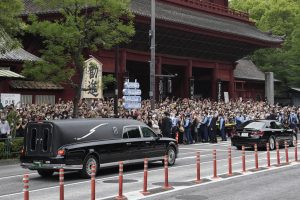On Tuesday a funeral service for slain former Prime Minister Abe Shinzo was held at a temple in central Tokyo. The private funeral was attended by 1,000 guests including Abe’s family members, close friends, politicians, business leaders, and foreign officials.
While huge crowds of ordinary citizens lined the street to bid farewell to Abe, the Ministry of Foreign Affairs said it has also been inundated with more than 1,700 messages from some 260 countries, regions, and organizations offering condolences to Abe.
U.S Secretary of State Antony Blinken made an unscheduled stopover in Tokyo while on a scheduled visit to Southeast Asia. He paid his respects to Abe, who was gunned down last Friday at a public election event in the western city of Nara. He also delivered a letter from U.S President Joe Biden to Abe’s widow Akie and Prime Minister Kishida Fumio.
U.S Secretary of the Treasury Janet Yellen also attended the funeral and met with Japan’s Finance Minister to discuss the country’s pressing economic challenges.
At the White House flags flew at half-staff in tribute to Abe. Biden condemned the violent attack and visited the Japanese ambassador’s residence, offering his condolences. “This is a loss not only to his family and the Japanese people but also for the world. [Abe] was a man of peace and judgment,” he said in the handwritten letter.
Abe left his mark on the international community by forging strong diplomatic links with regional neighbors, including Taiwan. He was instrumental in launching the Quadrilateral Security Dialogue between Australia, India, Japan, and the United States, which pushes for a “free and open Indo-Pacific” largely in response to China’s military expansion and growing dominance in the region.
In 2015, Abe began to publicly name Taiwan as an “important partner” and has positioned Taiwan’s campaign for democracy as a part of regional security. Taiwan’s Vice President William Lai made a rare visit to pay his respects at Abe’s residence, making him the highest-ranking official from Taiwan to visit Japan since the break in diplomatic ties in 1972. Both Japan and Taiwan both stressed that Lai’s visit was in a private capacity.
But at the same time, the Abe administration sought to compartmentalize security issues in an attempt to improve business and trade ties. Chinese President Xi Jinping expressed his “deep condolences” a day after Abe’s tragic passing. The Chinese embassy in Japan also expressed “shock” and a representative thanked Abe for his contribution to improving China-Japan relations during his tenure.
Under Abe, Japan’s relationship with South Korea was severely strained, hitting rock bottom in late 2019 with South Koreans boycotting Japanese products after Japan imposed export restrictions on chipmaking materials. But in recent months both countries have pledged to turn a new leaf and cooperate on the joint threat posed by North Korea’s accelerating missile test launches.
South Korean President Yoon Suk Yeol, who took office in May, paid a visit to the Japanese embassy in Seoul to pay his respects. He acknowledged Abe’s dedication to the prosperity and development of Asia and expressed his hope that “South Korea and Japan will cooperate closely in the future.” His administration recently started pursuing a consultative mechanism in a bid to lay the foundation for addressing lingering historical issues in the Japan-South Korea relationship.
Before the casket was sent for cremation, Abe’s widow Akie told mourners at the funeral that her husband’s sudden death still feels like a dream. She said she hoped her late husband’s political vision will be carried on: “I know he had a lot of unfinished business as a politician… but he planted many seeds which I am certain will sprout.”
The later part of Abe’s political career was marred with numerous corruption and cronyism scandals, mostly notably allegations of the misuse of funds for the annual cherry blossom viewing party and the cheap sale of premium land to private school operator Moritomo Gakuen, which had ties to Akie Abe. While his public approval rating dipped, he managed to weather the scandals. The Abe administration also came under fierce public scrutiny for its handling of the COVID-19 pandemic in 2020 before his abrupt departure from office in late August 2020.
The government confirmed a state funeral will be held in the autumn.
































